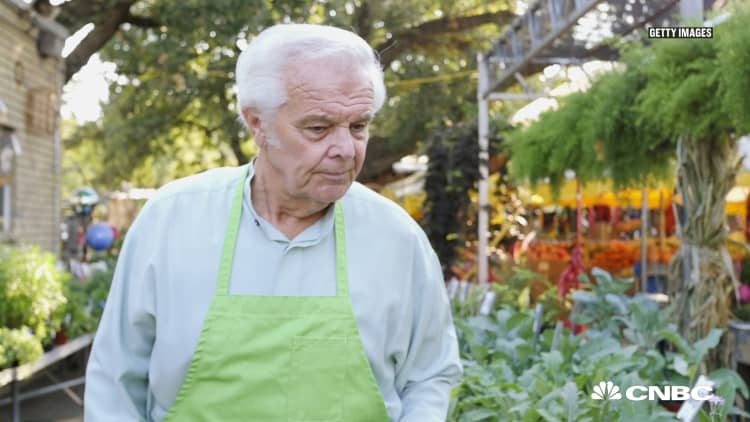When Bonnie Leonard retired from academia at age 65, she knew she was not done working.
"Not for a minute!" said Ms. Leonard, now 79. "I just thought about what I wanted to do next."
After nearly 20 years as dean of continuing education at Wellesley College in Massachusetts, she thought she might go back into teaching, or move into development work, because fund-raising had been part of her job at the college. Instead, she decided to learn how to help others manage change: Since 2002, Ms. Leonard has been running her own coaching business, focusing on middle-aged women who are looking to make career and life transitions.
"I love it," said Ms. Leonard, who lives in North Kingstown, R.I.
More from The New York Times:
Money Worries for Retired Women
In the Middle of a Career, and Finding a New One
Finally, a Retirement Plan for Job-Hopping Millennials
She also suspects that as a septuagenarian fully engaged in her work, she is not alone. "The fact is we're living a lot longer, and we're healthier," she said. "So to me it makes total sense that people would remain fully engaged."

Her perception that people are working longer (not necessarily because they have to, but because they want to) is backed up by data. According to the Pew Research Center, in the year 2000, just under 13 percent of Americans 65 and over reported being employed full or part time. By May 2016, that figure had jumped to 18.8 percent — meaning that nearly nine million Americans 65-plus were gainfully employed.
Over the next five years, that number is expected to increase to 32 percent.
"The context of aging and work is changing," said Jacquelyn B. James, a psychologist and co-director of the Center on Aging and Work at Boston College. In addition to health and longevity, she said education is a factor. "This is one of the most educated generations in history," Dr. James said. "A lot of the jobs people are continuing in are fields in which you use the mind, not the body."
It is in such industries — education, law, business, social services — that older workers are not only staying, but thriving. "In jobs where knowledge is the basis, you don't see a performance deficit with age," said Laura Carstensen, a psychologist and director of the Stanford Center on Longevity.
The stereotype of aging workers unable to keep up with the demands of their jobs is passé, Dr. Carstensen said. "The old way of thinking about older workers is just not right anymore."
Indeed, a 2015 study by the Transamerica Center for Retirement Studies found that 44 percent of those who retired later than planned said they continued to work because they chose to. Why? "They know they're doing a good job," Dr. Carstensen said.
Case in point: Louis DeHaas, a former city prosecutor in Los Angeles who is now a medical malpractice lawyer. At age 75, Mr. DeHaas, who goes by Duke, estimates that he is in trial about six to eight months a year — a heavy load. Although he is usually the oldest person in the courtroom, Mr. DeHaas said, he's thriving at this point in this career.
"I think I'm a much better lawyer now," said Mr. DeHaas, who lives in Malibu, Calif. "I'm more patient, I understand people better."
He still works hard at it, forcing himself to keep current on music, sports and fashion trends. "I don't want to be judged as an old fogey standing there in a trial," he said, admitting that his 15-year-old granddaughter is his source of insight into popular culture.
Rae Ferguson is also flourishing, at age 71 — although, like Ms. Leonard, in her second career.
Ms. Ferguson is an associate professor of African-American history at the University of Rhode Island. "I'm a latecomer to this profession," said Ms. Ferguson, who was in her 50s when she completed her dissertation at Indiana University — about the role of black women's clubs in Indianapolis in the early 20th century.
Ms. Ferguson, who grew up in Germany, taught music, practices meditation and yoga and has survived cancer, said she believes that her varied life experiences have helped her in the college classroom. "I think I have a lot more ways to hook students in than I would have when I was 35," she said.
Of course, working past traditional retirement age is neither desirable nor feasible for some.
"My basic sense is that there are two types of workers in their late 50s," said Michael D. Hurd, an economist and director of the RAND Corporation Center for the Study of Aging in Santa Monica, Calif. "People who have health problems or are economically distressed, and who might want to work longer but probably won't be able to, will leave the labor force at 62 when eligible for Social Security. More healthy ones will want to work longer for the financial reward. The other is a group who are healthy, fit, able to work and find their work satisfying. They will continue to work into their 60s or even beyond."
Russ Umphenour tried retirement in his 60s. It didn't work. "For a couple years, my wife and I traveled a lot," said Mr. Umphenour, now 72. "It was fun, but I got bored and felt my life had no purpose."
Now Mr. Umphenour, who has residences in Atlanta and New York City, has returned to the restaurant business he worked in all his life. He is involved in several ventures, principally as chief executive officer for Stevi B's Pizza Buffet, a franchise of 29 restaurants in the Southeast.

Mr. Umphenour was hired last year to turn around the business, and he is working 55-hour weeks. "I'm visiting our stores regularly, talking with the crew, making pizzas and serving customers," he said. "Because I love the business, I love this."
That engagement is part of why Mr. Hurd thinks the trend toward white-collar workers staying on the job longer is a positive one. "I think as a broad matter, most work is actually good for people," he said. "You're forced to interact with people and forced to engage your brain. It's also good in terms of people's financial fitness. Just one year's salary keeps you from drawing down on your savings, and may even allow you to add to your savings."
As the oldest baby boomers hit 70 in 2016, the ranks of septuagenarians who are not just working, but working at the top of their game is likely to grow significantly. Ms. James, of the Center on Aging and Work at Boston College, applauds this trend.
"We live in a work-identified culture," she said. "By the time you're in your 60s and 70s, you've probably worked yourself into something you enjoy doing. Others have been able to let go of things that they don't like about their job."
Yet, Dr. James said, "It's not a good strategy to think you're never going to retire." She said that ultimately, most people do have to stop working full time because of health, caregiving responsibilities or other factors.
Ms. Leonard, who runs the coaching business for middle-aged women, recognizes that and admits that while she is very involved with her business, she is trying to find more of what she calls "breathing space" in her busy life. Then again, she said: "I intended to retire from my coaching practice at 80. But now I've put that off until 85."


